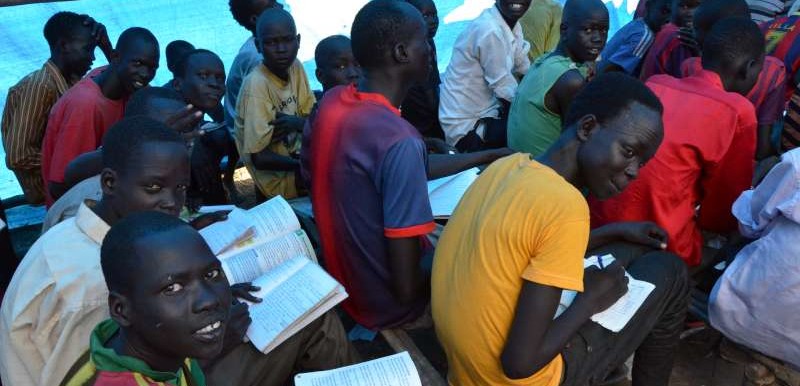Nearly 50 college students gathered last week at the University of Nebraska to celebrate the 73rd anniversary of the United Nations’ founding and to hear from someone whose life was forever changed by the U.N.: My own.
For many Americans, the work of the U.N. is largely invisible. It’s an abstract concept — a collection of flags waving in New York. For me, though, the U.N. represents some of the hardest — and most hopeful — days of my life.
I was 9 years old when I became a refugee. When fighting reached our village in what is now South Sudan, my brother and I fled our home on foot alone. Our parents had disappeared days before. We walked for a week before arriving at a refugee camp in Ethiopia. I’ll never forget our first night in the camp: No random gunfire; no planes dropping bombs overhead. It was so calm and peaceful. I had forgotten what that felt like.
I spent six years in that refugee camp. During that time, I relied on food from the U.N. World Food Programme. It was because of UNICEF — and the pencils and textbooks they provided — that I attended school for the first time. Before then, we didn’t even know the U.N. existed.
When I was 15 years old, I was lucky enough to come to Omaha with my brother. I learned to read, write, and speak English as a freshman in high school. In the past 12 years, I’ve been blessed with teachers and mentors who treated me just like any other student with the potential to learn.
Thanks to my education, I fulfilled a lifelong dream this summer by working at the U.N. headquarters in New York as a legal intern. I met ambassadors, U.N. officials, and other interns from all over the globe, including a fellow refugee from the Central African Republic. I attended Security Council meetings on resolutions to help the U.N. deliver aid to families in South Sudan, including young children displaced by conflict as I once was.
Before my internship ended, I had the honor of meeting U.N. Secretary-General António Guterres. As the former head of the U.N. Refugee Agency, he told me he understood the challenges faced by refugees, especially people like my brother and me who had to flee at such a young age.
I don’t know what my life would be like if I hadn’t received support from the U.N. as a child. I don’t know that I would still be alive. But I do know that there are so many other people out there like me. At a time when some U.S. leaders question support for the U.N, I want to raise my voice and say: I am a product of this generosity and the U.N.’s lifesaving work. And I want to remind everyone that the opportunity to transform lives — and to make the world a better place — is worth the small price. Peacekeeping and U.N. dues make up just roughly 0.2 percent of the U.S. federal budget.
Talking to my fellow college students, I was struck by some of the questions I received once they heard my story: “What was the journey to the refugee camp like?” “How many meals did you eat each day?” But what struck me most was how interested they were in the U.N.’s mission and ways they could get involved.
In 2016, I became an American citizen. Today I’m in my third year of law school at the University of Nebraska College of Law. No matter where my career may lead me, I know I want to honor and support human rights and help those in need — two pillars of the U.N.’s work.
I’m proud to be a South Sudanese American. My story would not have been possible without the U.N. That’s why I’m celebrating its founding and sharing my story.
The writer is a third-year law student at the University of Nebraska-Lincoln.
The views expressed in ‘opinion’ articles published by Radio Tamazuj are solely those of the writer. The veracity of any claims made are the responsibility of the author, not Radio Tamazuj.




